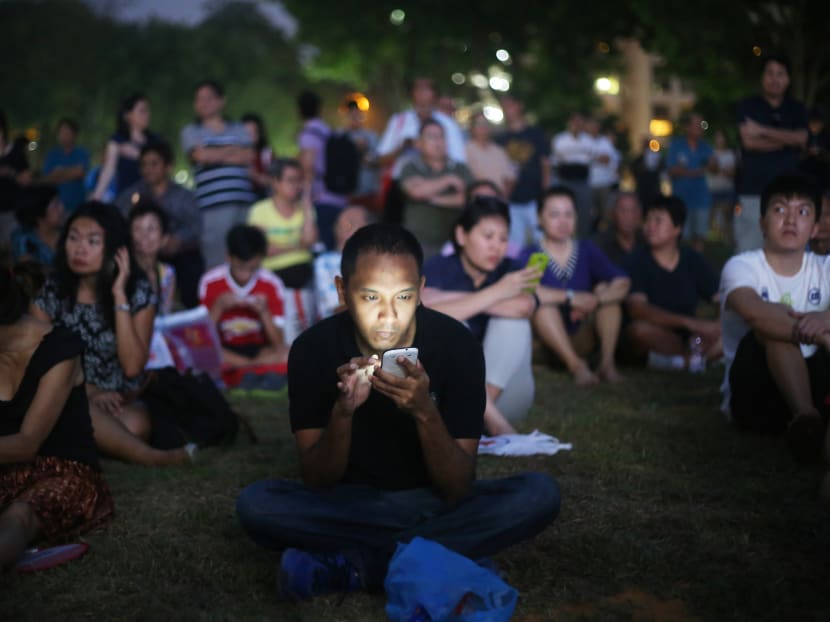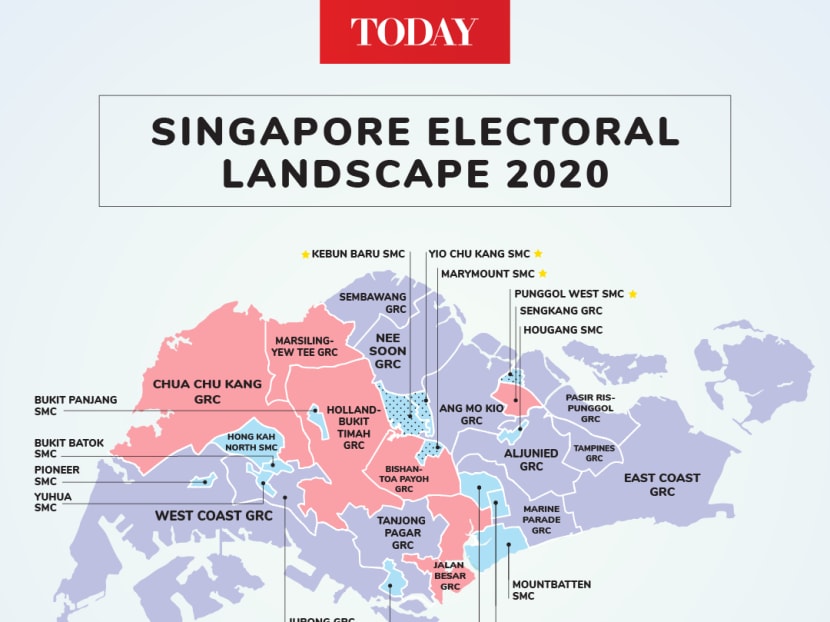Opposition at a disadvantage if next GE is called amid Covid-19 outbreak: Analysts
SINGAPORE — The coming General Election looks set to be one-of-a-kind, with political parties expected to go online to deliver their messages instead of holding outdoor rallies, analysts said on Friday (March 13).

A man looking at his handphone at a Singapore People's Party rally on Sept 8, 2015. In light of the Covid-19 situation, analysts are expecting political parties to be delivering their messages online instead of holding outdoor rallies during campaigning for the coming General Election.
SINGAPORE — The coming General Election looks set to be one-of-a-kind, with political parties expected to go online to deliver their messages instead of holding outdoor rallies, analysts said on Friday (March 13).
But should an election be held in the midst of the battle against Covid-19, it would be a controversial move and present a big disadvantage to the Opposition, the analysts told TODAY.
Prime Minister Lee Hsien Loong had said on Thursday in a recorded message that the outbreak could “continue for some time — a year, and maybe longer”.
Now analysts are expecting the coming election, which some of them have dubbed the “Covid election”, to be held in the first half of the year, possibly as early as next month.
This follows the release of the latest Electoral Boundaries Review Committee (EBRC) report on Friday (March 13).

While the GE must be held by April next year, Singapore Management University (SMU) law professor Eugene Tan called the potential decision to have the polls amid the Covid-19 outbreak a “controversial” one.
“It is reasonable for Singaporeans to feel whether having a GE at this point in time will result in needless infections,” said Associate Professor Tan.
“... there is the nagging question of whether it’s really necessary at this point in time, is it a proper cause of action? No one can say those are not legitimate concerns.”
The timing of the election, as well as possible curbs on the holding of mass political rallies, would also be disadvantageous to the opposition parties, said analysts.
On the other hand, the ruling People’s Action Party’s (PAP) handling of the Covid-19 outbreak, which has won praise globally, would help them shore up voter support, said Associate Professor Bilveer Singh, a political science professor at the National University of Singapore.
A DIGITAL ELECTION
The next GE would be a trend-setter, with parties campaigning online as social distancing measures are being put in place, after the Government announced on Friday that ticketed events with at least 250 participants are to be deferred or cancelled.
When asked how this would affect election rallies during a press briefing held before the release of the EBRC report, National Development Minister Lawrence Wong said event organisers would have to take the “necessary precautions” as they consider the scale of their event.
Not directly referring to election rallies, he also said that event organisers can split up their audiences in multiple rooms to ensure that participants are segregated and speeches could be viewed via video-streaming.
Mr Wong’s comments, analysts said, seem to be a hint that such measures could be used in place of outdoor rallies in the next GE.
More televised debates, political podcasts and live-streaming on social media channels should be expected.
Besides the possibility that rallies may not be held, or held in smaller sizes, Assoc Prof Tan said the landscape of this GE would also be very different, as candidates and voters navigate a way they can both interact with each other in a safe manner.
“Shaking hands, carrying babies is so much part of the election landscape. But because of Covid-19, I don’t think those will happen at all,” he said.
Assoc Prof Tan believes that the Elections Department would be announcing social distancing measures relating to elections soon.
DISADVANTAGEOUS FOR OPPOSITION
However shape or form the next GE would take, political analysts agree that the use of technology would generally be disadvantageous for the Opposition.
Firstly, there would be huge logistical costs for them as they have to book multiple venues and implement temperature scanning, said political analyst Woo Jun Jie.
If they were to decide to hold an election rally instead, it could potentially be a “political hot potato” and may inflict some political cost on the party, especially if someone attending contracts the virus at one of these rallies.
“No party would want to run that sort of risk at this point,” said Mr Woo.
The option to go digital then begs the question of which parties have the resources to carry out such an outreach method, said Assoc Prof Tan.
In addition, political analysts also pointed out that opposition party rallies have historically seen much bigger crowds than those organised by the PAP.
“PAP is a boring rally party, they don’t know how to rally. They do not have good communicators. The Opposition has very good political communicators. They are able to shift the ground during the nine days of campaigning normally,” said Mr Singh.
WHY NOW?
While the decision to hold a GE in the midst of the Covid-19 outbreak may come across as “counter-intuitive” to Singaporeans according to SMU’s Assoc Prof Tan, political analysts told TODAY that they were not surprised by the timing of the release of the EBRC report.
The release of the report — about seven months after the committee was formed — marks the penultimate step before Parliament can be dissolved for the GE.
In past years, a GE has been held just weeks or months after the release of the EBRC’s report. In the past four GEs, it took between one and three months from the release of the report to polling day.
Now analysts are saying that elections could be held as early as April, though others said May would be a likelier possibility.
In any case, the chances of holding an election would be “much higher” in the first half of this year, than the second half.
Dr Felix Tan, an associate lecturer at SIM Global Education, said that the Government’s release of the EBRC report is sending a message that “life has to go on”.
“We should not use the pandemic as an excuse to stop what has been planned,” he said. “Singaporeans are already mentally prepared for an election this year. Why hang on to it for even longer?”
The uncertainty of how the Covid-19 outbreak would develop also might mean that the window that the Government can call for the election, which must be held by April next year, is getting smaller.
“What the Government is thinking is to secure a strong mandate, so they can put in measures needed to counter the spread of the coronavirus,” said Dr Tan.
Notwithstanding the general consensus from the public that the Government has handled the outbreak well, the timing of the disease outbreak, though unfortunate, is in PAP’s favour, said Mr Singh.
“If the number of Covid-19 cases goes up to 1,000, people will say they mismanaged it. Why not do it now?” he added.
The constant presence of the ruling PAP ministers on the airwaves, as they deal with the outbreak, has also “paralysed the opposition”, pointed out Mr Singh.
“They are not in a position to do anything, they just watch, they become spectators. It makes people think we need an effective Government in times of crisis.”
However, there is a chance that this move by the ruling Government may backfire, said SMU’s Assoc Prof Tan.
“If voters feel sufficiently strong that the Government is being opportunistic and putting public health at risk, it could affect them. The question is how many people will have these sentiments?” he said.
The ruling Government would have to explain to voters why holding an election now would be necessary, said Assoc Prof Tan, and the likely narrative they would adopt is that a strong mandate is needed to take decisive action to manage the outbreak and the faltering economy.
“In a way, this is a bold move... I suspect they have done their sums and considered that it won’t backfire on them,” he added.











